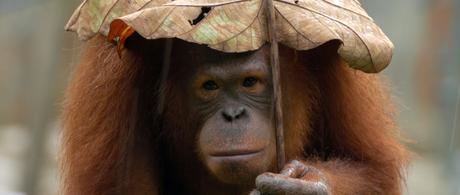
Apes in captivity are a lot easier to keep track of. This makes them very useful for scientific studies. As such, a lot of our understanding about the intelligence, behaviour, locomotion etc. of our closest living relatives comes from captive apes. The reliability of this research is dependent on the fact that these captive apes are basically representative of apes as a whole. However, new research on apes in captivity suggests this may not be the case.
A group of Swiss anthropologists built fake "nests" in the jungles of Borneo and Sumatra; where orangutans live. In them they placed a variety of objects orangutans were unlikely to have encountered before, such as an orangutan doll, plastic flowers, and the Swiss flag. The anthropologists set up hidden cameras and watched to see if the wild orangutans would approach the nests and investigate the objects. They then repeated the experiment with orangutans in zoos back home. Except they didn't include the Swiss flag in that study since good, patriotic Swiss orangutans were already familiar with it.
The results showed a marked difference in how the apes in captivity responded versus those in the wild. It took ~100 days for wild apes to begin investigating the nests; whilst orangutans in zoos began playing with the new objects within an hour of discovery.
Now, this isn't to say that apes in captivity are - objectively speaking - more intelligent than their wild counterparts. In the end even wild orangutans began investigating these objects. In fact, it's fairly easy to see why this difference developed. Apes in captivity are typically given many new objects as "enrichment", encouraging them to explore their environment to find hidden food. This would obviously make the captive orangutans a lot more willing to investigate another set of new objects.
So our understanding of how smart apes are isn't wrong. It just might exaggerate the frequency and speed with which apes put their smarts to use.
For instance, last week I wrote about research that showed chimps quickly developed a preference for cooked food. Based on this I inferred that once our ancestors had developed fire cooking wouldn't have been far behind. However, if our wild ancestors had been a lot more conservative - like these wild orangutans - then it could have taken an order of magnitude longer than that research seemed to imply.
Just like humans, we need more representative research into apes.
Reference
Forss, S. I., Schuppli, C., Haiden, D., Zweifel, N., & van Schaik, C. P. (2015). Contrasting responses to novelty by wild and captive orangutans. American Journal of Primatology.

